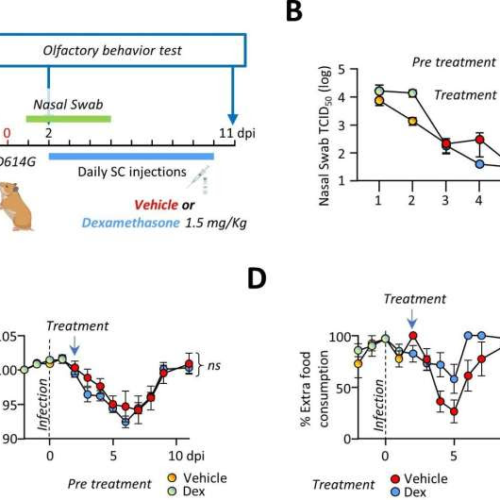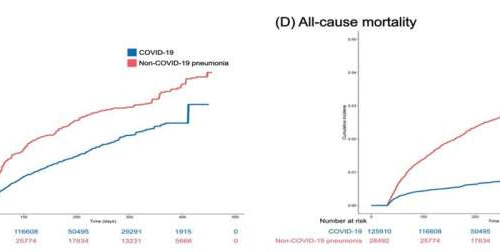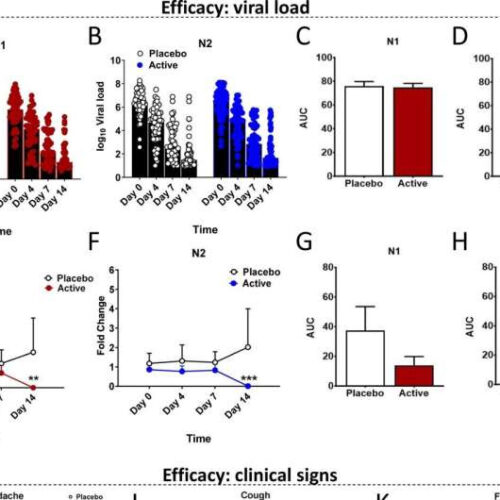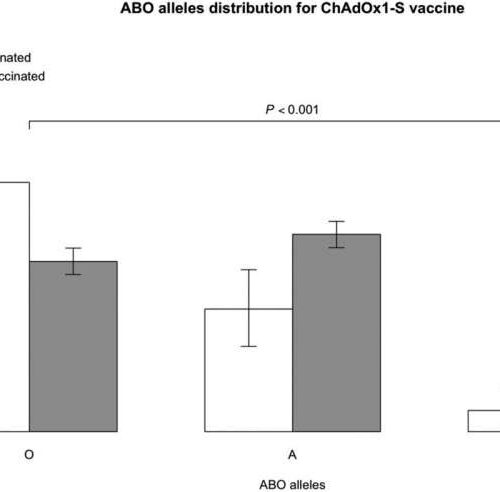Reports and Proceedings MINDSET CONSULTING Petrovax announced today the positive results from “Long-CoV-III-21,” a randomized, double-blind, placebo-controlled trial evaluating the efficacy and safety of bovhyaluronidase azoximer in adult patients with pulmonary sequelae of COVID-19. Bovhyaluronidase azoximer, marketed under the brand name Longidaza, is a polymer-conjugated hyaluronidase with an extended half-life. The study drug and placebo...
Tag: <span>covid 19</span>
Younger patients more affected by neurologic manifestations of long COVID
by Elana Gotkine Younger and middle-aged patients seem to be disproportionately affected by neurologic manifestations of postacute sequelae of severe acute respiratory syndrome coronavirus 2 infection (Neuro-PASC), according to a study published online Nov. 22 in the Annals of Neurology. Natasha A. Choudhury, M.D., from the Northwestern University Feinberg School of Medicine in Chicago, and colleagues conducted a...
Surprising connection between COVID-19 and cancer regression
by Northwestern University Credit: Journal of Clinical Investigation (2024). DOI: 10.1172/JCI179527 A new study led by scientists from the Northwestern Medicine Canning Thoracic Institute and published in the Journal of Clinical Investigation has revealed a connection between COVID-19 infection and cancer regression. The team’s discovery could pave the way for novel cancer treatments. In an unexpected twist, the scientists observed that the...
NEW EVIDENCE SHEDS LIGHT ON ONE OF LONG COVID’S DRIVERS
JULY 29TH, 2024POSTED BY YALE(Credit: Getty Images) TAGS COVID-19IMMUNE SYSTEMSUNIVERSITY YALE UNIVERSITY New research offers evidence that autoimmunity—in which the body’s immune system targets its own tissues—is a driver in some cases of Long COVID. Why COVID-19 sometimes leads to Long COVID still confounds doctors, but researchers have several hypotheses to explain its often-debilitating symptoms....
COVID-19 virus can stay in the body more than a year after infection, research finds
by University of California, San Francisco Credit: Pixabay/CC0 Public DomainThe COVID-19 virus can persist in the blood and tissue of patients for more than a year after the acute phase of the illness has ended, according to new research from UC San Francisco that offers potential clues to why some people develop long COVID. The scientists...
COVID-19: A potential treatment for loss of smell
by INRAE—National Research Institute for Agriculture, Food and Environment Pathophysiological impact of early corticoid treatment on SARS-CoV-2 infection. (A) Experimental design to evaluate the treatment of SARS-CoV-2 infected hamsters with sub-cutaneous (SC) corticoid treatment started at 2 dpi until 11 dpi (days post infection) (B) Viral load in nasal swab collected from 1 to 5...
Study looks at cardiovascular risks in COVID-19 survivors
by Chung Ang University Researchers analyze primary and secondary cardiovascular outcomes in 132,784 inpatients with COVID-19 (October 8, 2020 to September 30, 2021) and 31,173 inpatients with non-COVID-19 pneumonia (January 1, 2019 to December 31, 2019) in Korea. The results indicate a lower risk of cardiovascular disease in COVID-19 patients. Credit: Won-Young Kim, Chung-Ang UniversityThe...
Clinical trial investigates new oral treatment for COVID-19
by IMIM (Hospital del Mar Medical Research Institute) Efficacy of treatment measured by the viral load and clinical signs. A and B: log10 viral load of SARS-CoV-2 in patients that received placebo or active compound (E-52862) during days 0, 4, 7, and 14 of the study. Data are expressed as individual values with median and...
Blood group may predict risk of stroke when receiving COVID-19 Oxford-AstraZeneca vaccine
by Royal Holloway, University of London ABO allele distribution between ChAdOx1-S vaccinated and unvaccinated groups. Credit: Journal of the Royal Society of Medicine (2023). DOI: 10.1177/01410768231214341 A large international research collaboration, led by an academic from Royal Holloway, University of London, found that blood groups could help predict the risk of venous strokes associated with the...
COVID-19 infection associated with increased risk of developing Guillain-Barré syndrome
Reviewed by Lily Ramsey, LLMOct 18 2023Having a COVID-19 infection is associated with an increased risk of developing the rare disorder called Guillain-Barré syndrome within the next six weeks, according to a study published in the October 18, 2023, online issue of Neurology®, the medical journal of the American Academy of Neurology. The study also...




